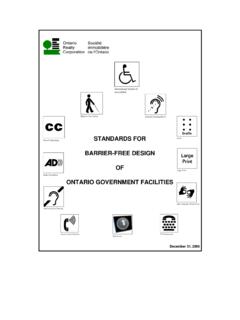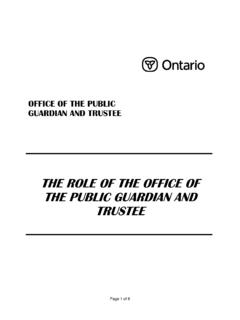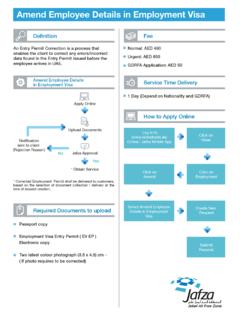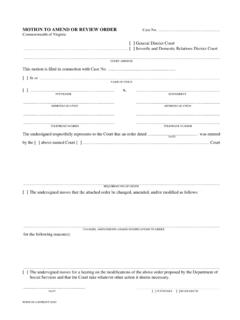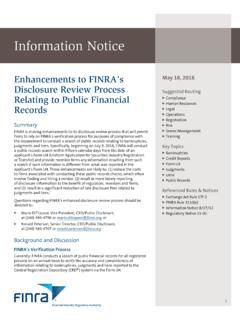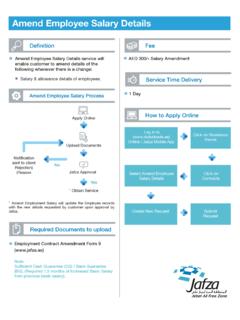Transcription of Bill 148 - Legislative Assembly of Ontario
1 2ND SESSION, 41ST LEGISLATURE, Ontario 66 ELIZABETH II, 2017 bill 148An Act to amend the Employment Standards Act, 2000 and the Labour Relations Act, 1995 and to make related amendments to other Acts The Hon. K. Flynn Minister of Labour Government bill 1st Reading June 1, 2017 2nd Reading 3rd Reading Royal Assent EXPLANATORY NOTE SCHEDULE 1 EMPLOYMENT STANDARDS ACT, 2000 The Schedule makes various amendments to the Employment Standards Act, 2000. The Act is amended to bind the Crown, subject to an exception in section 4 of the Act (Separate persons treated as one employer).
2 New section prohibits employers from treating, for the purposes of the Act, a person who is their employee as if the person were not an employee under the Act. New Part (Requests for Changes to Schedule or Work Location) adds an ability for employees to request changes to their schedule or work location. Employers who receive these requests must discuss them with the employee and either grant them or provide reasons for a denial. New Part (Scheduling) sets out new scheduling provisions. These include a minimum of three hours pay for shifts that are under three hours, minimum pay for being on call, a right to refuse requests or demands to work on a day that an employee is not scheduled to work with insufficient notice and entitlement to pay for three hours of work in the event of cancellation with insufficient notice.
3 The provisions of a collective agreement prevail over some of these new provisions. The existing power to make regulations requiring employers to pay a minimum prescribed amount to employees who work fewer than three hours in a day is repealed. Part VIII (Overtime Pay) is amended to establish a rule for overtime pay for employees who have two or more regular rates for work performed for the same employer. Section (Determination of minimum wage) is amended to increase the minimum wage on January 1, 2018. The minimum wage increases again on January 1, 2019 and is subject to an annual inflation adjustment on October 1 of every year starting in 2019.
4 The minimum wage for employees who serve liquor now applies only if the employee also regularly receives tips or other gratuities from their work. Part X (Public Holidays) is amended. The rules for the calculation of public holiday pay under section 24 are amended to be based on the number of days actually worked in the pay period immediately preceding the public holiday. The rules for calculating entitlement to pay under sections 27, 28 and 30 are amended to require payment of premium pay for work on a public holiday instead of allowing a different day to be substituted.
5 Section 29 is amended to establish new substitution rules when a public holiday falls on a day that would not ordinarily be a working day for an employee. Part XI (Vacation With Pay) is amended to provide a minimum of three weeks of vacation entitlement to employees whose period of employment is five years or more, beginning after the end of the employee s vacation entitlement year. Related amendments are made throughout the Part. Part XII (Equal Pay for Equal Work) is amended to add two new provisions. The first is an entitlement for equal pay from an employer regardless of a difference in employment status.
6 The second is an entitlement for equal pay for assignment employees of a temporary help agency who perform substantially the same work as an employee of the temporary help agency s client. Related amendments are made to the reprisal provisions in the Act to prohibit reprisals against employees who make inquiries about rates of pay or who disclose their rate of pay for the purpose of determining or assisting in determining whether an employer is complying with Part XII. Part XIV (Leaves of Absence) is amended. The entitlement to family medical leave is increased from up to eight weeks to up to 27 weeks.
7 New section establishes an entitlement to up to 104 weeks of unpaid leave if a child of the employee dies for any reason, instead of the current entitlement to leave only in the event of a crime-related child death. New section retains the entitlement to crime-related child disappearance leave but increases the entitlement from up to 52 weeks to up to 104 weeks. Section 50 (Personal Emergency Leave) is amended to provide personal emergency leave to all employees, not just employees of employers who regularly employ 50 or more employees. In addition, two days of personal emergency leave are now required to be paid days.
8 The paid days have to be taken before any unpaid days of personal emergency leave in a calendar year. The reasons for which this leave may be taken are amended to include experiencing sexual or domestic violence or the threat of sexual or domestic violence. Employers retain the right to require evidence of entitlement to these days but are not permitted to require a certificate from a qualified health practitioner. Part (Temporary Help Agencies) is amended to add a new section This section requires temporary help agencies to provide an assignment employee with one week s notice or pay in lieu if an assignment that was estimated to last for three months or more is terminated before the end of its estimated term unless another assignment lasting at least one week is offered to the employee.
9 Subsection 88 (5) (Interest) is amended to allow the Director to calculate rates of interest for amounts owing under different provisions of the Act or the regulations and for money held by the Director in trust. New sections and allow the Director to provide recognition of employers that meet prescribed criteria. ii The requirement in section (Steps required before complaint assigned) for a complainant to take steps specified by the Director before the Director assigns a complaint for investigation is repealed. Subsection 103 (1) (Order to pay wages) is amended to allow employment standards officers to order employers to pay wages directly to employees.
10 Similar amendments are made to other order-making powers. Section 113 (Notice of contravention) is amended to provide that the penalties for contraventions shall be determined in accordance with the regulations, which permit the establishment of a penalty range or of different penalties that apply to individuals and to corporations. Employment standards officers are given the discretion to determine a penalty within the range in accordance with the prescribed criteria, if any. New provisions are added to authorize the Director to publish information related to a deemed contravention of the Act following the issuance of a notice of contravention.


